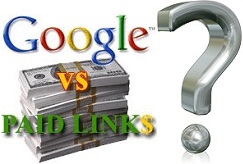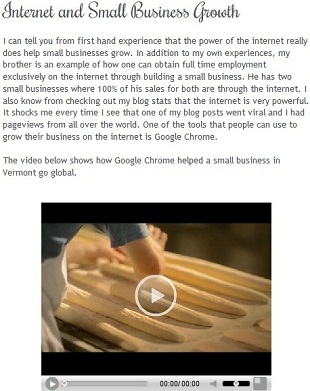 Every senior webmaster knows that buying links in order to promote a website can get you penalized by Google (drop in rankings or even a complete ban in extreme cases). But what happens when Google wants to promote one of its own products? Apparently, it is going on a paid links campaign!
Every senior webmaster knows that buying links in order to promote a website can get you penalized by Google (drop in rankings or even a complete ban in extreme cases). But what happens when Google wants to promote one of its own products? Apparently, it is going on a paid links campaign!
Danny Sullivan from Search Engine Land has exposed this surprising story (i even dare to say scandal) yesterday- Google was engaged (maybe still is) with a sponsored links marketing campaign for its web browser, Chrome, where allegedly the company was paying to publish links and videos to multiple sites and blogs by using a third party marketing company.
Google Guidelines On Paid Links
In this point i want to refer you the the paid links section in Google guidelines for webmasters where it is stated very loud and clear that buying or selling links in order to improve website’s search rankings is a violation of the guidelines and can “negatively impact” the website’s rankings (or in other words penalty):
“Buying or selling links that pass PageRank is in violation of Google’s Webmaster Guidelines and can negatively impact a site’s ranking in search results.” (From Google Webmasters Guidelines)
In addition, it is stated that buying or selling links for advertising purposes only and not for search rankings promotion is legitimate as long as the link is marked with the “no-follow” tag. Therefore, the Chrome’s paid marketing campaign can be potentially legitimate if indeed it served advertising purposes only and not intended for search rankings manipulations.
Legitimate Advertising Or Search Manipulation?
Let’s try to reveal what sort of marketing campaign was Google engaged with for Chrome. To do so, i tried to identify if the paid links (or JavaScript video links in this case) were a legitimate form of advertising or a way to improve unethically Chrome’s search rankings.
Danny Sullivan has discovered that in Chrome’s paid links campaign, the sentence “What can Google Chrome do for your future?” is appearing regularly. Therefore, i conducted a simple Google search for this exact term and investigated what kind of links are they- Are they a legitimate advertising links with the no-follow tag, or are they links that designated only to improve the Chrome page’s rankings.
Additionally to what Danny Sullivan already examined in his post, i checked myself 9 more websites that includes the noted term from above. In all of the examined sites there was a video that in fact was a JavaScript link which is referring to Chrome’s download page, where it is passing the PageRank (there isn’t any no-follow tag). Also, the pages that contained the video were in general very thin of additional content. Here’s a typical sponsored post screenshot:

These were clearly not the cases of a legitimate advertising and it is very obvious that it is a sophisticated way to improve Chrome page’s search rankings. The verdict in this case is very conclusive: Search manipulation.
Matt Cutts Warns Against JavaScript Paid Links
I found a great video of Google’s Matt Cutts that warns webmasters against paid links using JavaScript already back in 2009, which fits perfectly to the current case. In the video he is emphasizing to add a the no-follow tag or block the links using the robots.txt file to prevent passing along the “link juice”. Here is the video:
What Will Happened Next?
It is now interesting to see how would Google will deal with this case. Will it downgrade or even ban Chrome from its search results as it would have treat any other site? This would certainly hurt the growth of its web browser that just recently surpassed Firefox in market share. It is also damaging Google’s reputation that is constantly fighting against spamming and thin-content pages, while now the company has distributed these exact type of pages to the web…